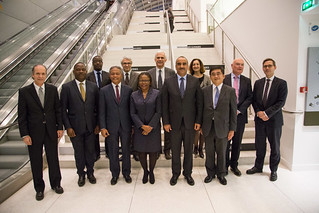Côte d'Ivoire
Major step forward in international tax co-operation as additional countries sign landmark agreement to strengthen tax treaties
|
In addition to those signing today, Algeria, Kazakhstan, Oman and Swaziland have expressed their intent to sign the Convention, and a number of other jurisdictions are actively working towards signature by June 2018. So far, four jurisdictions – Austria, the Isle of Man, Jersey and Poland – have ratified the Convention, which will enter into force three months after a fifth jurisdiction deposits its instrument of ratification. |

|
|
The Convention is the first multilateral treaty of its kind, allowing jurisdictions to integrate results from the OECD/G20 BEPS Project into their existing networks of bilateral tax treaties. “Today’s signing of the multilateral convention is another major step towards updating the international tax rules through the swift implementation of the BEPS package,” said OECD Secretary-General Angel Gurría. “Beyond saving signatories from the burden of re-negotiating thousands of tax treaties bilaterally, the convention results in more certainty and predictability for businesses, and a better functioning international tax system for the benefit of our citizens.”
|
The OECD/G20 BEPS Project delivers solutions for governments to close the gaps in existing international rules that allow corporate profits to « disappear » or be artificially shifted to low or no tax environments, where companies have little or no economic activity. Revenue losses from BEPS are conservatively estimated at up to USD 240 billion annually, or the equivalent of up to 10% of global corporate income tax revenues. Almost 100 countries and jurisdictions are currently working in the Inclusive Framework on BEPS to implement BEPS measures in their domestic legislation and bilateral tax treaties. The sheer number of bilateral treaties makes updates to the treaty network on a bilateral basis burdensome and time-consuming.
The Convention, developed through inclusive negotiations involving more than 100 countries and jurisdictions under a mandate delivered by G20 Finance Ministers and Central Bank Governors, solves this problem. It will modify existing bilateral tax treaties to swiftly implement the tax treaty measures developed in the course of the OECD/G20 BEPS Project. Treaty measures that are included in the Convention include those on hybrid mismatch arrangements, treaty abuse and permanent establishment, and dispute resolution, including an optional provision on mandatory binding arbitration, which has been taken up by 28 jurisdictions.
The OECD is the depositary of the Convention and is supporting governments in the process of signature, ratification and implementation.
The text of the Convention, the explanatory statement, background information, database, and position of each signatory are available at http://oe.cd/mli.
Media queries should be directed to Pascal Saint-Amans, Director of the OECD Centre for Tax Policy and Administration, (+33 6 26 30 49 23) or the OECD Media Office (+33 1 45 24 97 00).
Working with over 100 countries, the OECD is a global policy forum that promotes policies to improve the economic and social well-being of people around the world.
Related Documents